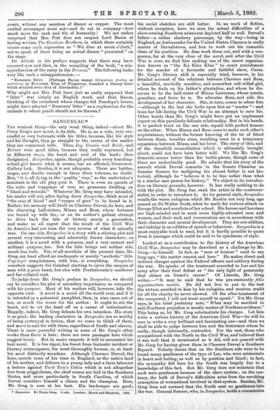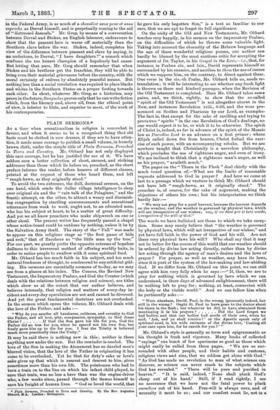SANGUELAC.*
Tan weakest thing—the only weak thing, indeed—about Mr. Percy Greg's new novel, is its title. He is, as a rule, very suc- cessful or very fortunate with his titles, because, like his style and his thought, they go straight to the centre of the matter they are concerned with. Thus, Ivy, Cousin and Bride, and Errant were good titles, because they really expressed, but in different ways, the heart and soul of the books thus designated. Sanguelac, again, though probably every boarding- school girl knows what it means, has an affected, Grosvenor- -Gallery look. Besides, it is not adequate. There are battles, sieges, and deaths enough in these three volumes, no doubt. But, "it is all dying in the ' quality ' way," as the undertaker's assistant in the old play puts it. There is even no parade of the suits and trappings of woe, no gruesome dwelling on " blood and wounds." Whatever Mr. Greg may have intended, his reader will not, after laying down Sanguelac, think most of "the seas of blood" and "surges of gore" to be found in it. Rather, his memory will dwell on Clarence Derval, its hero, and the charming half-sisters, Minna and Rose, whose fortunes are bound up with his ; or on its author's gallant attempt to drive back the tide of history nearly a generation, and make us all regret that the result of the Civil War in America had not been the very reverse of what it actually was. On one side, Sanguelac is a story with a stirring plot and several very interesting and admirably drawn characters; on another, it is a novel with a purpose, and a very earnest and militant purpose, too. But the title brings out neither side, much less both. Yet, of all novelists of the present time, Mr. Greg can least afford an inadequate or merely " methetic " title. Zap-a-pie completeness, with him, is everything. Sanguelac somehow suggests Sir Galahad starting to carve the casques of men with a pure heart, but also with Postlethwaite's sunflower and fur-collared coat.
To judge from Mr. Greg's preface to Sanguelac, we should say he considers his plot of secondary importance, as compared with his purpose. Most of his readers will, however, take the opposite view. A novel is a novel all the world over, and if it is intended as a polemical pamphlet, then, in nine cases out of ten, so much the worse for the author. It ought to stir the heart, not to set the head off on a career of ratiocination. 'Happily, indeed, Mr. Greg defeats his own intention. His story is so good, fhb leading characters in Sanguelac are so worthy of being portrayed in fiction, that we come to think of them, and move to and fro with them, regardless of South and slavery. There is more powerful writing in some of Mr. Greg's other works than there is here; there are even passages here which suggest hurry. But in many respects it will be accounted his best novel. It is his ripest, his freest from fantastic incident or literary extravagance, his most thoroughly human, or, at least, his most distinctly mundane. Although Clarence Derval, the hero, spends some of his time in England, as the native land of his mother, and delivers to a young lady and a farm labourer a lecture against Uncle Tom's Cabin which is not altogether free from priggishness, the chief scenes are laid in the Southern 'States, and more particularly in South Carolina, of which Derval considers himself a citizen and the champion. Here, Mr. Greg is seen at his best. His landscapes are good;
J4anyudne. By Percy Greg. 3 rob. London : Hurst and Blaekett. 1883.
his social sketches are still better. In no work of fiction, without exception, have we seen the actual difficulties of a slave-owning Southern aristocrat depicted half so well. Derval's father—a rather shadowy personage, by the way—being in England, as Ambassador for the United States, Clarence is really master of Dervalstown, and free to work out his romantic ideas of his position. He does work them out, and with a ven- geance, for at the very close of the novel, and after the Civil War is over, we find him making use of the secret organisa- tion known as "the Ka Klux Klan" to exact punishment for the murder of a favourite and faithful slave, Casca. Mr. Greg's literary skill is especially tried, however, in his detailed account of the relations between Clarence and Rose, a beautiful, morbidly sensitive, and somewhat self-willed girl, whom he finds on his father's plantation, and whom he dis- covers to be the half-sister of Minna Lawrence, whose cousin, guardian, and lover he is. He educates Rose, and aids the development of her character. She, in tarn, comes to adore him —although to the last she looks upon him as "master "—and loses her life during the Civil War in an attempt to save his. Other hands than Mr. Greg's might have put an unpleasant aspect on this peculiarly delicate relationship. But in his hands, it is perfect trust on the one side, repaid with perfect honour on the other. When Minna and Rose come to make each other's acquaintance, without the former knowing of the tie of blood between them, troubles arise, resulting even in a temporary separation between Minna and her lover. The story of this, and of the threefold reconciliation which is ultimately brought about, could not have been better told. We like Mr. Greg's domestic scenes better than his battle-pieces, though some of these are undoubtedly good. He admits that his story of the assault which Derval commits in the Senate Chamber on Senator Somers for maligning his absent father is not his- torical, although he "believes it to be less unfair than what in a similar case passes for history." We object to its introduc- tion on literary grounds, however. It has really nothing to do with the plot. Mr. Greg has sunk the artist in the controver- sialist, in order to introduce it, As for general style, Sanguelac recalls the warm enlogium which Mr. Ruskin not very long ago passed on Sir Walter Scott, when he made his curious attack on George Eliot and novelists of her school. His heroes and heroines are high-minded and in most cases highly-educated men and women, and their walk and conversation are in accordance with their character and mental development. They are not oddities, and indulge in no oddities of speech or behaviour. Sanguelac is a most enjoyable book to read, but it is hardly possible to quote from it passages which could be said to be specimens of style.
Looked at as a contribution to the history of the American Civil War, Sanguelac may be described as a challenge by Mr. Greg,—to himself. In fact, as " men of honour " used to say long ago, " the matter cannot end here." He makes direct and indirect charges against the Federal officers and soldiery during the war. He speaks of the treatment accorded to Lee and his army after their final defeat as " the only light of generosity that shines on Grant's career." Of Lincoln, Mr. Greg writes :—" It may be said that he was pre-eminently feliz opportunitate mortis. He did not live to put to the test the virtues ascribed to him by his eulogists, and receives credit for all the charity he never showed. Of the after-treatment of the conquered, I will not trust myself to speak." Yet Mr. Greg says, in his brief prefatory note, " What may be ascribed to anti-Northern prejudice is mostly matter of Northern evidence." This being so, let Mr. Greg substantiate his charges. Let him write a serious history of the American Civil War—he will be sure to write a very brilliant and fascinating one—and then we shall be able to judge between him and the historians whom he really, though informally, contradict. For the rest, those who sympathised with the North in the Civil War, and believed that it was well that it terminated as it did, will not quarrel with Mr. Greg for having given them in Clarence Derval a Southern Bayard. Nobody denies that on the Southern side were to be found many gentlemen of the type of Lee, who were aristocrats in heart and feeling, as well as by position and blood ; in fact, the sympathy felt here for the South was largely due to a knowledge of this fact. But Mr. Greg does not maintain that such were gentlemen because of the slave system ; on the con- trary, the bulk of Derval's difficulties arise from the revolting conception of womanhood involved in that system. Besides, Mr. Greg does not contend that the North sent no gentlemen into the war. General Somers, who, in Sanguelac, holds a commission in the Federal Army, is as much of a chevalier sans peur et sans reproche as Derval himself, and is perpetually coming to the aid .of "distressed damsels." Mr. Greg, by means of a conversation between Derval and Stokes, an English labourer, endeavours to -show that the peasant here is worse off materially than the Southern slave before the war. Stokes, indeed, completes his view of the difference between peasant and slave by saying, in -an undertone, to Derval, " I have daughters !" a remark which confuses the too honest champion of a hopelessly bad cause. But letting that pass, Mr. Greg should remember that when -Stokes and his brethren get the franchise, they will be able to bring even their material grievances before the country, with the moral certainty of redress by absolutely peaceful means. But nothing less than a social revolution was required to place blacks and whites in the Southern States on a proper footing towards -each other. In short, whatever Mr. Greg, as a historian, may prove in the future, Sanguelac proves only that he can write fiction which, from the literary and, above all, from the ethical point -of view, is inferior to little, and superior to most, of the work of his contemporaries.



































 Previous page
Previous page